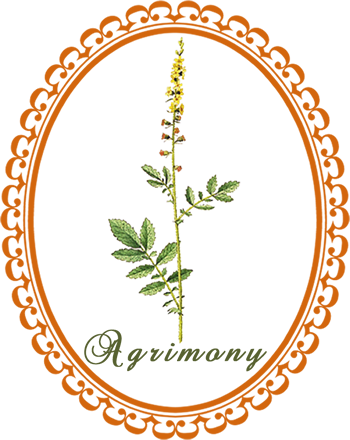
Agrimony: astringent and tonic properties, making it a valuable remedy for the treatment of childhood diarrhea and urinary incontinence...
Common Names: Agrimony, Cocklebur, Sticklewort, Church Steeples
Botanical Name: Agrimonia eupatoria
Family: Roseaceae
Plant Type: Hardy perennial
Parts Used: Dried shoots, flowers, and leaves
Flowering: July - August
Agrimony grows throughout Europe, Canada and the United States. It can be found flourishing in both woods and open fields.
Description: Agrimony is a perennial plant, growing 2-3 feet high, with an upright mature brown stem covered with soft, silky hairs. The hairy leaves are alternate and pinnate divided, with coarsely toothed leaflets. At the top of the long spike-like stem grow numerous small yellow flowers (church steeples), the blooms opening one above another. It also bears burr-like fruit (cocklebur), which has hooked bristles at the upper end which cling to any person or animal coming into contact with the plant. Agrimony's leaves and flowers give off a lemony scent when crushed.
Cultivation: Average dry soil in sun to part shade. Tolerates a wide range of pH. Hardy to zone 7.
Harvesting: Harvest agrimony when the plant is in full bloom. Pick the leaves, the flowers, and the stems during the late spring or early summer. Use fresh or dry. To dry agrimony, carefully spread out the leaves, the flowers, and the stems on a wire rack in a warm dry area. Store the powdered and crumbled down plant material in airtight containers and use when needed.
Agrimony Magick
Protection. Sleep.
Gender: Masculine
Planet: Jupiter
Element: Air
Use in protection and banishment spells or sachets.
Breaks hexes and returns spells back to their sender.
Sprinkle agrimony leaves around your home to invite good luck.
Add half a cup of agrimony tea to your laundry to remove residual negative energy.
Use a tea made from agrimony leaves in your cleaning water to purify and bless a new home.
A sprig placed beneath the head will bring a restful sleep that will last until the sprig is removed.
To boost your mood and cleanse your aura, burn some dried leaves and allow the smoke to wash over you.
Herbal Healing with Agrimony
Cosmetic Uses: As an astringent skin toner
Medicinal Actions: Anti-spasmodic, astringent, carminative, cholagogue, diaphoretic, diuretic, hepatic, tonic, vulnerary
Medicinal Uses: Agrimony is not widely used in modern herbology, but its actions as a purifying bitter tonic combined with its astringent properties make it a valuable herb. Agrimony is a digestive tonic, and is thought to help regulate liver and gall bladder function. It is often taken in a tea form to aid in recovery from winter colds, fevers, incontinence and diarrhea. Agrimony is a specific in childhood diarrhea. Gargle with an infusion of agrimony to relieve a sore throat and laryngitis. Use a strong decoction for sores, blemishes and pimples. Agrimony ointment will help heal wounds, bruises, sores or minor ulcers. An agrimony bath helps soothe aching muscles and joints.
Contraindications:
- Avoid during pregnancy
- Agrimony is an astringent herb, avoid of constipated
- May cause photosensitivity, so avoid direct exposure to the sun if you are taking this herb
- Use caution if you are diabetic; use of agrimony may lower blood sugar
Native American Herb Wisdom
Across North America, various indigenous peoples used the plant for medicinal purposes. Among the Iroquois people, a drink made from the roots of the plant was used as a cure for diarrhea. Among the Cherokee, the plant was used for the same purpose, to reduce fever, and for a range of other problems. The Ojibwa used the plant for urinary problems, and the Meskwaki and Prairie Potawatomi used it as a styptic for nosebleeds.
Source: wiki
If you appreciate the information provided,
please help keep this website running. Blessings!
© 2008-2025 aromaworx.ca. All rights reserved.

